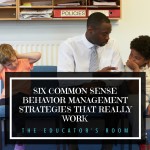While I realize that effective classroom management is essential to effective teaching and learning, I sometimes worry that we educators over-do it. Are we failing to inspire a basic desire to do the right thing? Do we really need to hand out prizes for making it to school every day and not acting like an animal on the bus? The answer is that even on the most exhausting days, seamless positive reinforcement is essential to classroom success.
It is first important to understand what positive reinforcement is and what it is not. Behaviorists, like B.F. Skinner, recognized positive reinforcement as way to teach desired behavior. Repeatedly reward “students” along the way and they will be able to learn a complex behavior: birds can ring bells and mice can navigate mazes. Jean Piaget came along and helped us understand that behavior can be shaped through positive reinforcement, but cautioned that children are more than little mindless adults. In Piaget’s view, behavior can be suggested by adults, but there’s no telling what a child will do with the information, as all teachers would agree.
The fact is, our students of all ages need to learn behavior as much as they need to learn content, as this anchor quote from the PBIS program explains:
If a child doesn’t know how to read, we teach. If a child doesn’t know how to swim, we teach. If a child doesn’t know how to multiply, we teach. If a child doesn’t know how to drive, we teach. If a child doesn’t know how to behave, we… teach? Or punish? Why can’t we finish that last sentence as automatically as we do the others? John Herner (1998)
We must apply the same principles for teaching behavior as teaching content. We must break it down into doable chunks and reward our students along the way as they make progress toward the final goal. You wouldn’t hand a third grader a long division problem and expect them to solve it on the first try. You’d break it down, step by step with lots of guided practice. That’s what all the positive reinforcement and constant encouragement are all about. In reality, many of our students don’t know what the right thing to do is.
[bctt tweet=”students of all ages need to learn behavior as much as they need to learn content” username=”EducatorsRoom”]
They learn behavioral norms and expectations as we provide meaningful praise and positive reinforcement. Everyone likes to hear a word of encouragement: “You rock! Well done!” but only specific praise builds specific behavior. Providing precise behavior feedback is like recognizing attention to assignment details. “I could tell you were working really hard to control yourself today,” or “I noticed you stopped yourself when you started to get frustrated,” says a lot more than “Good Job.”
Positive reinforcement is more than targeted comments. Especially in the elementary setting, physical reminders, such as earning tickets and weekly and quarterly rewards, play an important role in shaping behavior. No matter how you measure goal achievement (behavior contracts, moving clips, or grades), recognizing the right steps along the way is positive reinforcement. We should remember to be a little more Piaget than Skinner. We are not scientists teaching birds to ring bells. We are teaching young people the very important job of how to be a thoughtful, responsible human being. This is not an easy task on either end of the equation. Like any new thing, unfamiliar behaviors are learned best when broken down into manageable chunks. And educators are more likely to stick with this difficult task when their behavior is positively reinforced.







